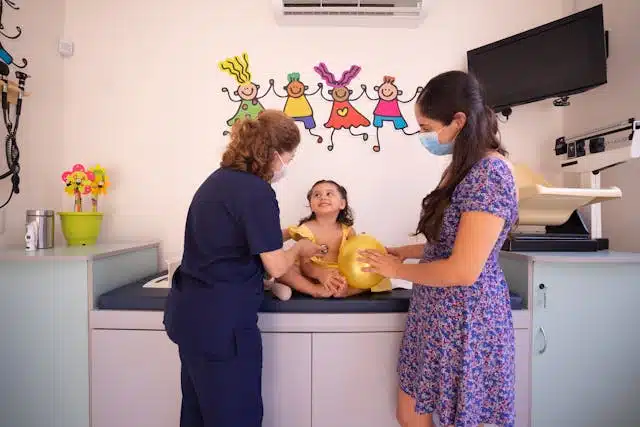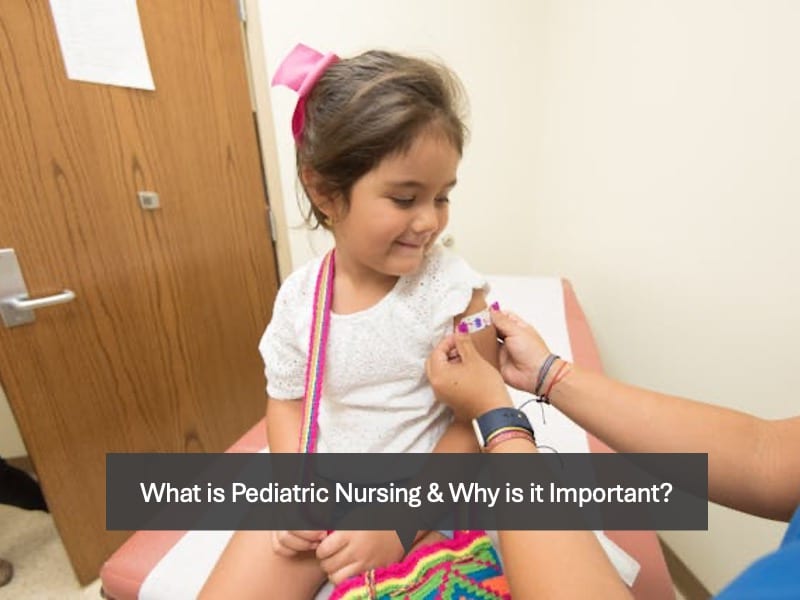What is Pediatric Nursing & Why is it Important?
Pediatric nursing is one of the most vital and specialized branches of healthcare, focusing on the comprehensive well-being of infants, children, and adolescents during their most formative years.
Unlike general nursing, this discipline requires an in-depth understanding of developmental psychology, age-specific anatomy, child communication styles, and family dynamics.
Children are not just small adults; their physiological responses, emotional needs, and medical conditions differ significantly and evolve rapidly as they grow.
Pediatric nurses are uniquely trained to navigate this complexity, delivering age-appropriate care while maintaining a calm, comforting presence that reduces fear and promotes healing.
Beyond clinical expertise, pediatric nurses serve as educators, advocates, and emotional anchors for both children and their families.
They are often the first to notice subtle changes in behavior or health, enabling early interventions that can prevent complications and improve long-term outcomes.
Their role also extends outside the hospital, shaping community health through school programs, wellness screenings, and family support initiatives.
As childhood health challenges become more complex, with rises in chronic conditions, mental health concerns, and health disparities, these nurses stand at the frontline of pediatric care innovation and compassionate delivery.
From hospital rooms to school clinics, pediatric nursing remains a cornerstone of effective and empathetic healthcare for young patients.
What is a Pediatric Nurse?

A pediatric nurse is a licensed nursing professional who specializes in the medical care of infants, children, and adolescents from birth through young adulthood.
These nurses are trained to address the physical, emotional, developmental, and psychological needs of children at various stages of growth, providing care that is both medically precise and age-appropriate.
Pediatric nurses work in a variety of settings, including hospitals, pediatric clinics, schools, and community health organizations.
Their responsibilities range from conducting routine physical exams and administering vaccines to assisting with complex diagnoses and offering emotional support to families.
They are also instrumental in monitoring developmental milestones, recognizing early signs of illness, and educating caregivers on treatment plans and preventive health practices.
To become a pediatric nurse, individuals typically earn a registered nursing (RN) license and pursue further education or certification in pediatrics offered by pediatric nurse practitioner schools, such as becoming a Certified Pediatric Nurse (CPN) or Pediatric Nurse Practitioner (PNP)
This additional training equips them to understand the nuances of child physiology and behavior, allowing them to deliver safe, effective, and compassionate care tailored to young patients.
Pediatric nurses play an essential role in creating a healthcare environment where children feel safe, supported, and empowered, making pediatric nursing a cornerstone of child-centered medical care.
What Makes Pediatric Nursing Different?
Pediatric nursing isn’t just adult care adapted for smaller patients; it requires expertise in child development, emotional behavior, and age-specific communication.
Since children often express symptoms nonverbally or differently by age, pediatric nurses must recognize subtle cues and respond with precision.
While all nurses receive some pediatric training, specializing in this field involves advanced education in child psychology, family dynamics, and pediatric diagnostics, often through pediatric nurse practitioner programs.
This specialized knowledge allows them to treat children holistically and effectively.
Why is Pediatric Nursing Important?

Pediatric nurses do far more than administer medication or take vital signs, as they serve as the backbone of child-centered healthcare.
Their role spans physical care, emotional support, education, and advocacy, all tailored to the unique needs of children at every developmental stage.
By combining clinical expertise with compassionate communication, pediatric nurses play a crucial role in ensuring that children not only recover from illness but also thrive in the long term.
Building Trust with Young Patients
Hospitals can be overwhelming for children as unfamiliar faces, strange sounds, and physical discomfort often trigger anxiety or fear.
Pediatric nurses bridge this gap by using age-appropriate language, play therapy, and distraction techniques to create a sense of safety and familiarity.
Establishing trust isn’t just about comfort; it has a direct impact on the quality of care.
Children who feel safe are more likely to communicate their needs, participate in procedures, and respond positively to treatment.
Supporting Families Through Stressful Times
When a child is sick, the entire family is affected.
Pediatric nurses provide more than medical care; they guide and support parents through unfamiliar terrain.
From explaining procedures to answering difficult questions, they help caregivers feel informed and emotionally supported.
Their consistent presence during hospital stays or major treatments offers stability.
By balancing clinical skills with empathy, pediatric nurses alleviate family stress and improve the overall care experience.
Acting as a Child Advocate
Young patients often struggle to express what they feel, making pediatric nurses essential advocates.
Their close observation of behavior and subtle health changes allows them to detect early signs of distress or complications.
By voicing concerns, questioning treatment plans when necessary, and alerting the care team to changes, pediatric nurses ensure that each child’s needs are acknowledged, understood, and addressed in a timely and effective manner.
Teaching Health in Kid-Friendly Ways
Health education is a core part of pediatric nursing.
Nurses teach children and their families how to manage conditions such as asthma, diabetes, or post-surgical care using child-friendly explanations, visuals, and games.
By turning complex health instructions into engaging, understandable lessons, they empower families to confidently care for their child at home and prevent complications from arising.
Staying Calm in Children’s Emergencies
Children’s emergencies require fast, precise action and a calm demeanor.
Pediatric nurses are trained in child-specific emergency protocols, which account for differences in anatomy, physiology, and developmental responses.
Their ability to remain composed during high-stress situations not only improves care but also helps soothe frightened children and families, ensuring a more stable, coordinated response in critical moments.
Community and School-Based Pediatric Nurses
Pediatric nurses are vital in community settings, where they address health disparities and provide accessible care.
In schools, they manage chronic conditions, administer first aid, and screen for developmental or behavioral issues.
In clinics and public health programs, they offer vaccinations, wellness checks, and health education, often serving families with limited access to traditional healthcare.
Their work helps catch problems early and supports healthier childhood development across diverse communities.
Final Thoughts: The Future of Pediatric Nursing: Challenges and Opportunities
Pediatric nursing is rapidly evolving to meet rising rates of childhood mental health conditions, complex chronic illnesses, and the growing need for family-centered care.
At the same time, digital health tools and telehealth are reshaping how pediatric care is delivered, requiring nurses to integrate technology without losing the personal connection children and families rely on.
Emerging priorities such as trauma-informed care, cultural sensitivity, and mental health integration demand that pediatric nurses continue learning and adapting.
Their multifaceted role, combining clinical skill with advocacy, education, and emotional support, remains essential in shaping healthier, more resilient futures for young patients.
While the tools and challenges may change, the heart of pediatric nursing stays the same: guiding children and their families toward healing with compassion, insight, and expertise.
This website does not provide medical advice. This website site does contain affiliate links, and purchases may earn a commission.
Read my Medical Disclaimer, Review Disclaimer, and Publishing Policies for more details. Use of this site indicates acceptance of these terms.



